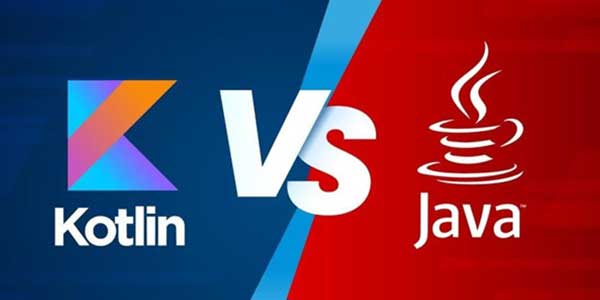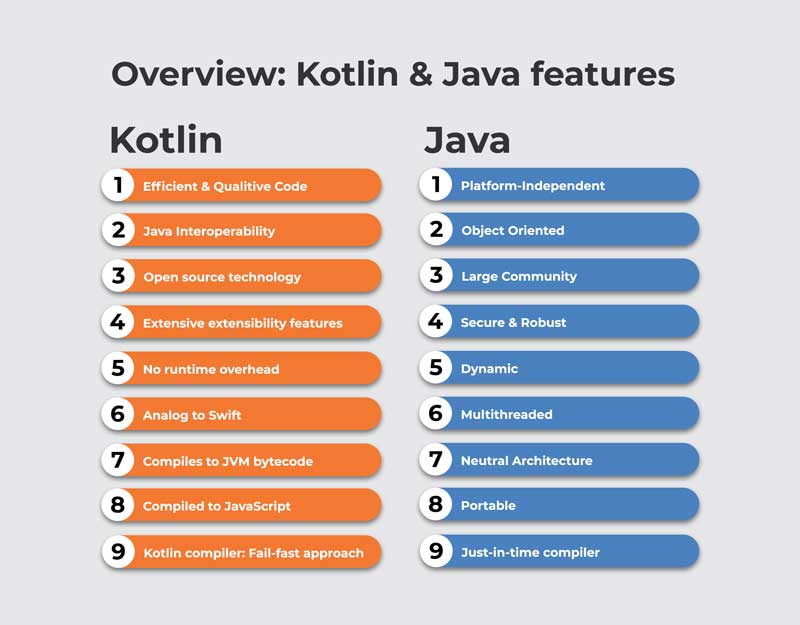
When it comes to Android app development, two primary programming languages dominate the landscape: Kotlin and Java. Both languages offer unique features and advantages, but which one is better? In this article, we will compare Kotlin and Java, exploring their strengths, weaknesses, and suitability for Android app development. By understanding the key differences between these languages, developers can make an informed decision and choose the language that best aligns with their project requirements.
Table of Contents
Overview Of Kotlin:
Kotlin, introduced by JetBrains in 2011, has rapidly gained popularity as a modern programming language for Android app development. Kotlin is fully interoperable with Java, allowing developers to seamlessly integrate Kotlin code into existing Java projects. It boasts concise syntax, enhanced readability, and reduced boilerplate code, enabling developers to write clean and efficient code. Additionally, Kotlin offers features like null safety, extension functions, and coroutines, which enhance productivity and reduce common programming errors. With the official adoption of Kotlin by Google as a first-class language for Android development, it has become the preferred choice for many developers seeking a more expressive and modern programming language.
Advantages Of Kotlin:
Concise And Readable Code:
Kotlin’s concise syntax and modern language features contribute to writing clean and readable code. It eliminates boilerplate code commonly found in Java, such as semicolons, type declarations, and getters/setters. Kotlin’s expressive syntax allows developers to express complex ideas in a more concise and natural manner. This not only reduces the number of lines of code but also enhances code maintainability and readability. Developers can focus on the logic of their application rather than getting bogged down in verbose syntax, resulting in more efficient and maintainable codebases.
Null Safety:
Kotlin addresses one of the major pain points of Java development – null pointer exceptions. Kotlin’s type system distinguishes nullable and non-nullable types at the language level, minimizing the risk of null reference errors. This feature helps catch null-related issues during compile time rather than at runtime. By enforcing null safety, Kotlin improves the reliability of code and reduces crashes caused by null references. This reduces debugging time and leads to more robust and stable applications. Moreover, Kotlin provides safe calls (?.) and the Elvis operator (?:), which simplify null handling and reduce the need for explicit null checks, further enhancing code readability and reducing the likelihood of errors.
Interoperability With Java:
Kotlin’s seamless interoperability with Java is a significant advantage, especially for projects that have existing Java codebases or rely on Java libraries and frameworks. Kotlin code can coexist with Java code within the same project, allowing developers to leverage their existing Java knowledge and gradually migrate to Kotlin. This interoperability enables developers to adopt Kotlin incrementally, module by module, without disrupting the existing codebase. It also facilitates the reuse of well-established Java libraries, ensuring a wide range of resources and support for Kotlin projects. Developers can take advantage of Kotlin’s modern features while leveraging the vast Java ecosystem, providing flexibility and a smoother transition path.
Coroutines:
Kotlin introduces coroutines, a powerful feature that simplifies asynchronous programming. Coroutines enable developers to write asynchronous code in a more sequential and structured manner, resembling traditional synchronous code. This simplifies complex asynchronous operations, such as network requests or database access, without blocking the main thread. By managing concurrency more efficiently, coroutines enhance the responsiveness of Android apps and improve overall performance. Additionally, coroutines provide built-in support for cancellation, exception handling, and structured concurrency, making it easier to manage and reason about asynchronous code. This feature greatly simplifies the development of complex, responsive, and scalable Android applications.
Learn More: 10 Reasons To Choose Android For App Development

Overview Of Java:
Java, first released in 1995, has been the dominant programming language for Android app development for many years. It is a versatile and mature language that offers a robust ecosystem of libraries, tools, and frameworks. Java’s stability and compatibility make it a reliable choice for enterprise-level projects, particularly those that require extensive backward compatibility or integration with existing Java codebases.
Advantages Of Java:
Extensive Community And Resources:
Java has a vast and active community of developers, which translates into a wealth of resources and support available online. Java’s long-standing presence in the software development industry has fostered a strong community that actively contributes to open-source projects, shares knowledge through forums and blogs, and provides valuable insights and best practices. Developers can find comprehensive documentation, tutorials, and libraries for nearly every aspect of Android app development. The extensive community support ensures that developers can find solutions to common problems, seek guidance, and stay up-to-date with emerging trends and advancements in Java development.
Mature Ecosystem:
Java’s maturity is reflected in its robust ecosystem of libraries, frameworks, and tools. Over the years, Java has accumulated a vast collection of libraries and frameworks that cover a wide range of functionalities. These resources simplify and accelerate the development process, as developers can leverage existing solutions rather than building everything from scratch. Java’s ecosystem includes powerful frameworks like Spring, Hibernate, and Apache libraries, providing reliable and well-tested solutions for various development needs. The availability of mature tools, such as build systems (e.g., Maven and Gradle) and integrated development environments (e.g., Eclipse and IntelliJ IDEA), further enhances productivity and streamlines the development workflow.
Platform Independence:
One of Java’s core strengths is its “write once, run anywhere” principle. Java programs can be compiled into bytecode, which can then run on any platform with a Java Virtual Machine (JVM). This platform independence allows developers to create applications that can be deployed on multiple platforms without major modifications. Whether it’s Windows, macOS, Linux, or various mobile platforms, Java’s cross-platform capabilities offer flexibility and a wider potential user base for Android apps. This feature is particularly valuable for businesses that aim to reach a broad audience and minimize development efforts by targeting multiple platforms with a single codebase.
Performance:
Java’s performance capabilities have significantly improved over the years. The Java Virtual Machine (JVM) incorporates a Just-In-Time (JIT) compiler that optimizes code at runtime, resulting in efficient execution. JIT compilation analyzes code patterns and dynamically optimizes frequently executed sections, improving the overall performance of Java applications. Java’s mature runtime environment and years of optimization have made it highly performant, making it suitable for resource-intensive Android applications. Moreover, Java’s memory management system, including garbage collection, helps developers focus on the logic of their applications without worrying too much about memory allocation and deallocation, enhancing productivity and reducing the risk of memory-related errors.
Read More: How Much Does It Cost To Develop An App?
Conclusion
Both Kotlin and Java are powerful programming languages with distinct advantages for development. Kotlin offers enhanced productivity, null safety, and modern language features, making it a compelling choice for developers seeking more expressive and concise language. On the other hand, Java’s extensive ecosystem, backward compatibility, and mature tooling make it a reliable option for enterprise-level projects. When it comes to building Android Apps, Kotlin has taken the lead over Java in the last 5 years.

 About the Author:
About the Author:
















Be the first to write a comment.